Unit 35: Developing Individuals, Teams and Organisations - Report
VerifiedAdded on 2022/12/14
|19
|6015
|74
Report
AI Summary
This report delves into the critical aspects of developing individuals, teams, and organizations, focusing on the role of Human Resources. It begins by outlining essential HR professional skills, including communication, conflict management, decision-making, and technological proficiency, and then presents a SWOT analysis for a professional HR manager. The report differentiates between individual and organizational learning, highlighting the need for continuous learning cycles. It explores the contributions of High-Performance Work (HPW) systems to employee engagement and discusses various approaches to performance management. The analysis includes a skills audit, identifying areas for development and outlining methods for improvement, along with reflective statements on the learning process. The report is structured to provide a comprehensive understanding of the key elements necessary for fostering growth and success within individuals, teams, and the broader organizational context.
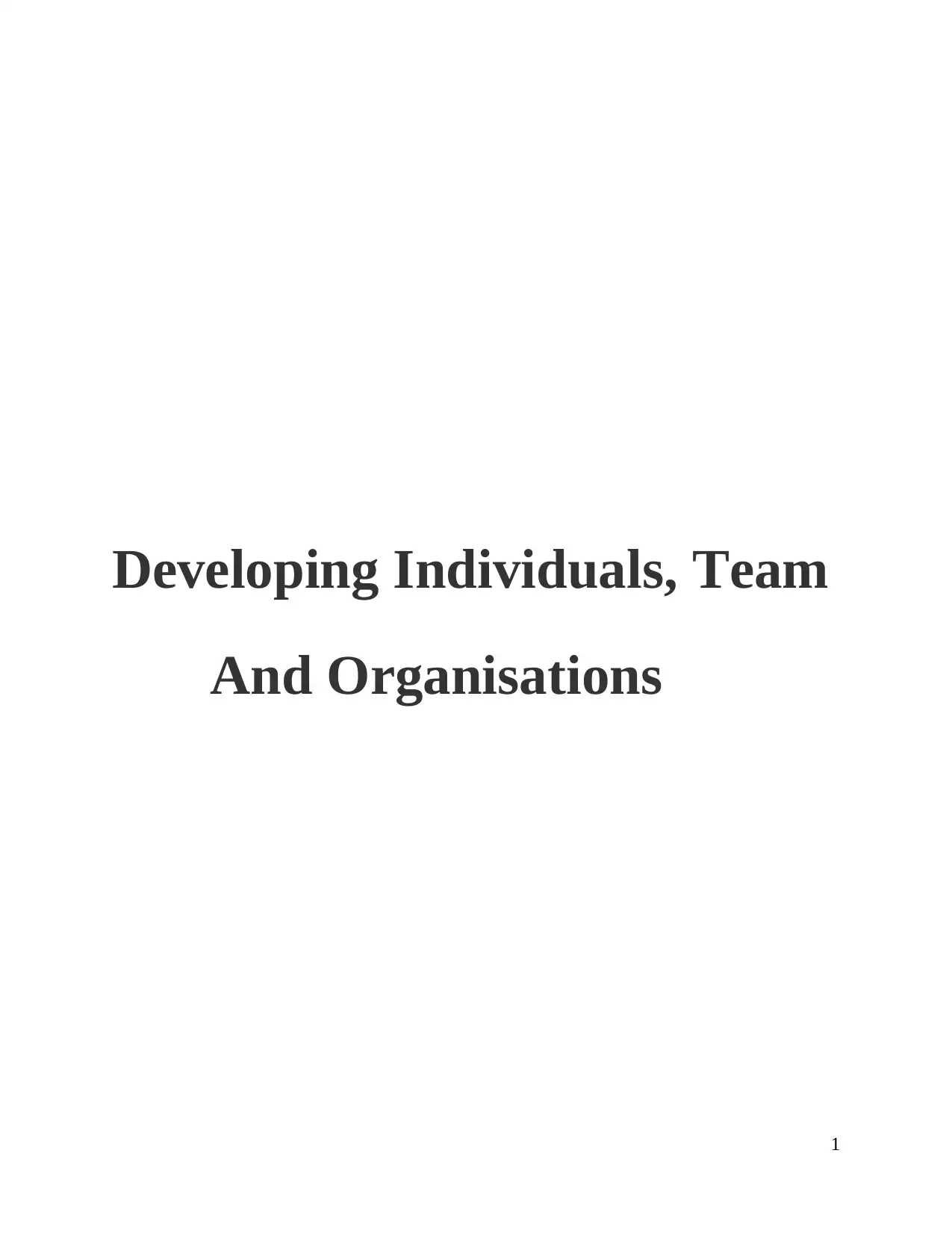
Developing Individuals, Team
And Organisations
1
And Organisations
1
Paraphrase This Document
Need a fresh take? Get an instant paraphrase of this document with our AI Paraphraser
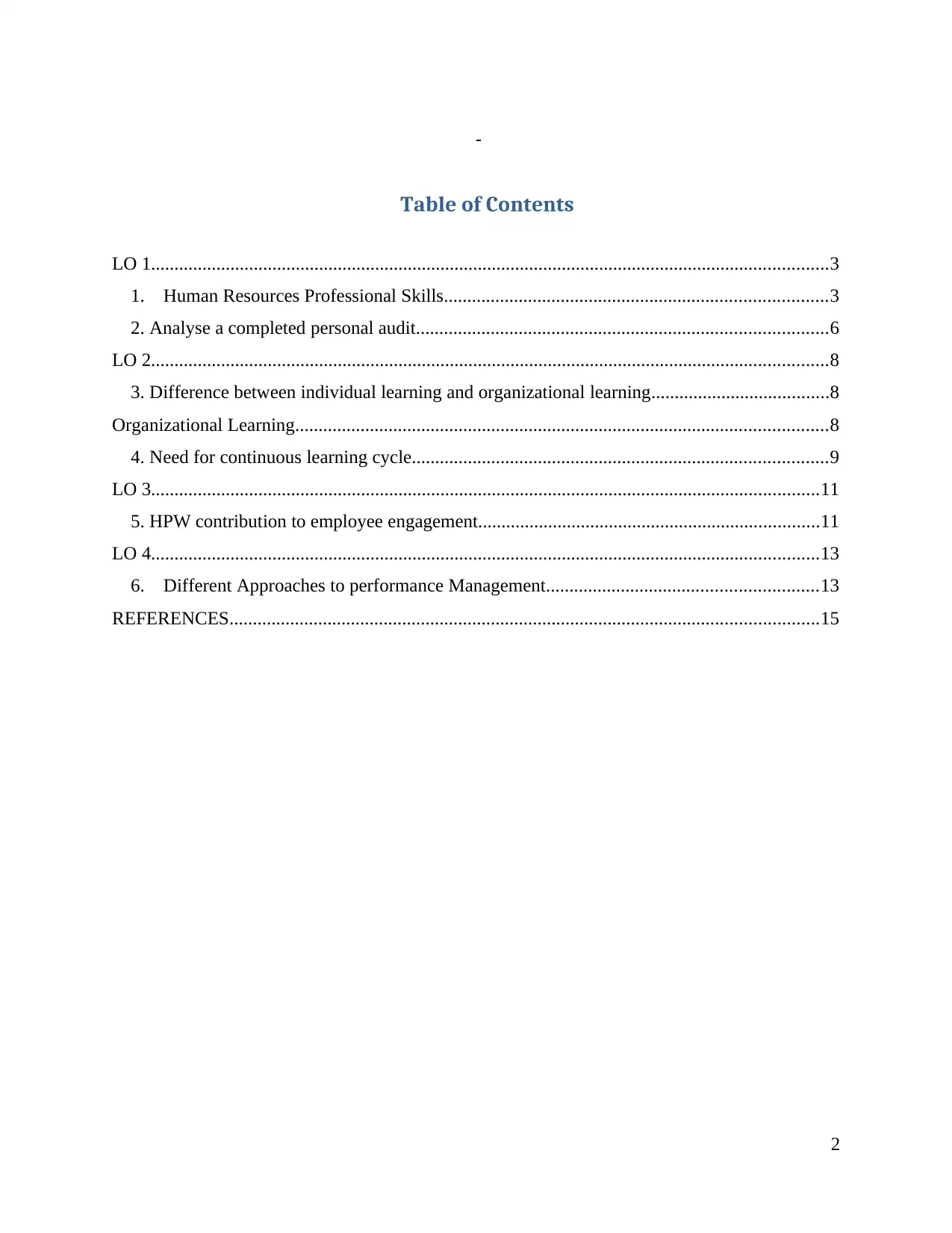
Table of Contents
LO 1.................................................................................................................................................3
1. Human Resources Professional Skills..................................................................................3
2. Analyse a completed personal audit........................................................................................6
LO 2.................................................................................................................................................8
3. Difference between individual learning and organizational learning......................................8
Organizational Learning..................................................................................................................8
4. Need for continuous learning cycle.........................................................................................9
LO 3...............................................................................................................................................11
5. HPW contribution to employee engagement.........................................................................11
LO 4...............................................................................................................................................13
6. Different Approaches to performance Management..........................................................13
REFERENCES..............................................................................................................................15
2
LO 1.................................................................................................................................................3
1. Human Resources Professional Skills..................................................................................3
2. Analyse a completed personal audit........................................................................................6
LO 2.................................................................................................................................................8
3. Difference between individual learning and organizational learning......................................8
Organizational Learning..................................................................................................................8
4. Need for continuous learning cycle.........................................................................................9
LO 3...............................................................................................................................................11
5. HPW contribution to employee engagement.........................................................................11
LO 4...............................................................................................................................................13
6. Different Approaches to performance Management..........................................................13
REFERENCES..............................................................................................................................15
2
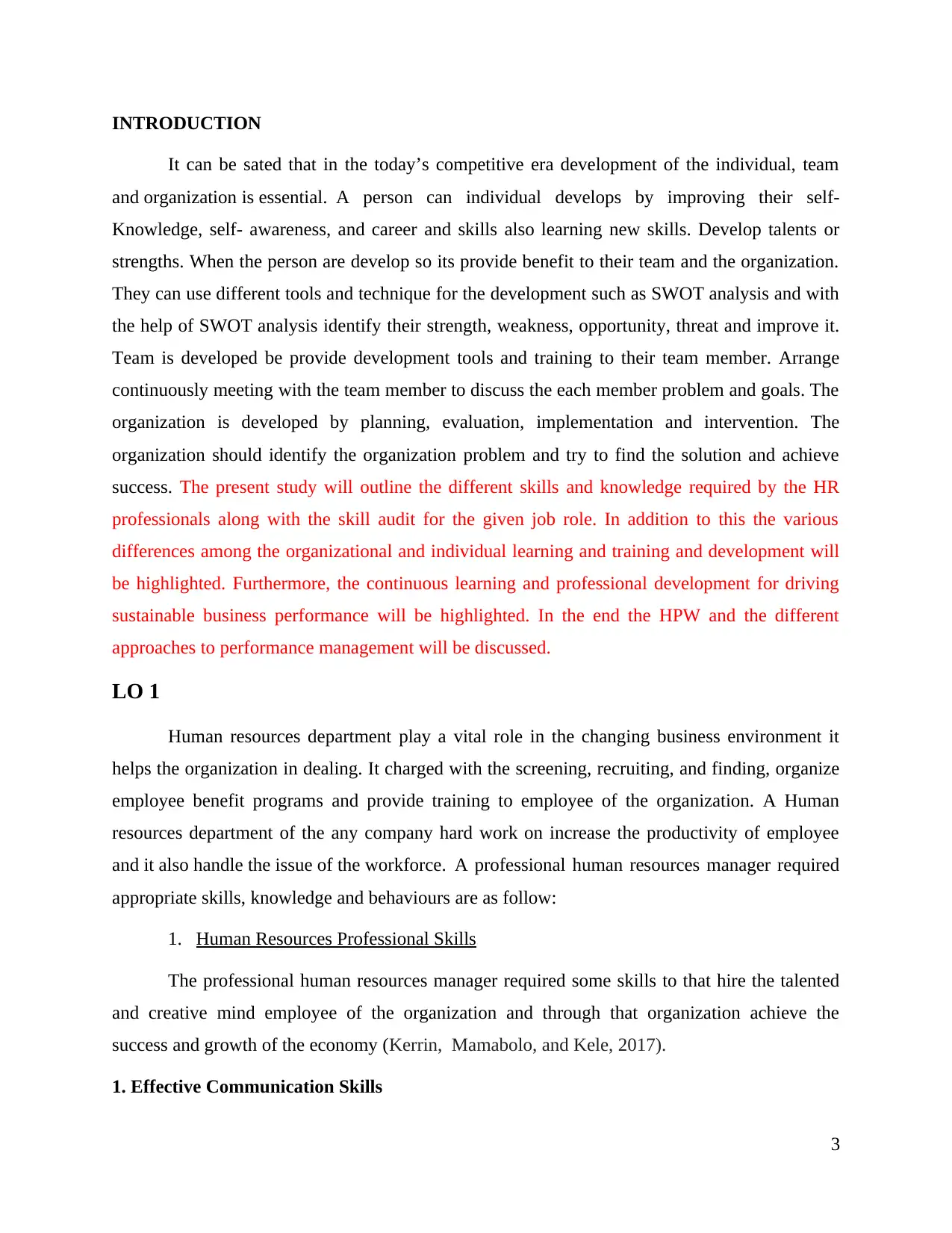
INTRODUCTION
It can be sated that in the today’s competitive era development of the individual, team
and organization is essential. A person can individual develops by improving their self-
Knowledge, self- awareness, and career and skills also learning new skills. Develop talents or
strengths. When the person are develop so its provide benefit to their team and the organization.
They can use different tools and technique for the development such as SWOT analysis and with
the help of SWOT analysis identify their strength, weakness, opportunity, threat and improve it.
Team is developed be provide development tools and training to their team member. Arrange
continuously meeting with the team member to discuss the each member problem and goals. The
organization is developed by planning, evaluation, implementation and intervention. The
organization should identify the organization problem and try to find the solution and achieve
success. The present study will outline the different skills and knowledge required by the HR
professionals along with the skill audit for the given job role. In addition to this the various
differences among the organizational and individual learning and training and development will
be highlighted. Furthermore, the continuous learning and professional development for driving
sustainable business performance will be highlighted. In the end the HPW and the different
approaches to performance management will be discussed.
LO 1
Human resources department play a vital role in the changing business environment it
helps the organization in dealing. It charged with the screening, recruiting, and finding, organize
employee benefit programs and provide training to employee of the organization. A Human
resources department of the any company hard work on increase the productivity of employee
and it also handle the issue of the workforce. A professional human resources manager required
appropriate skills, knowledge and behaviours are as follow:
1. Human Resources Professional Skills
The professional human resources manager required some skills to that hire the talented
and creative mind employee of the organization and through that organization achieve the
success and growth of the economy (Kerrin, Mamabolo, and Kele, 2017).
1. Effective Communication Skills
3
It can be sated that in the today’s competitive era development of the individual, team
and organization is essential. A person can individual develops by improving their self-
Knowledge, self- awareness, and career and skills also learning new skills. Develop talents or
strengths. When the person are develop so its provide benefit to their team and the organization.
They can use different tools and technique for the development such as SWOT analysis and with
the help of SWOT analysis identify their strength, weakness, opportunity, threat and improve it.
Team is developed be provide development tools and training to their team member. Arrange
continuously meeting with the team member to discuss the each member problem and goals. The
organization is developed by planning, evaluation, implementation and intervention. The
organization should identify the organization problem and try to find the solution and achieve
success. The present study will outline the different skills and knowledge required by the HR
professionals along with the skill audit for the given job role. In addition to this the various
differences among the organizational and individual learning and training and development will
be highlighted. Furthermore, the continuous learning and professional development for driving
sustainable business performance will be highlighted. In the end the HPW and the different
approaches to performance management will be discussed.
LO 1
Human resources department play a vital role in the changing business environment it
helps the organization in dealing. It charged with the screening, recruiting, and finding, organize
employee benefit programs and provide training to employee of the organization. A Human
resources department of the any company hard work on increase the productivity of employee
and it also handle the issue of the workforce. A professional human resources manager required
appropriate skills, knowledge and behaviours are as follow:
1. Human Resources Professional Skills
The professional human resources manager required some skills to that hire the talented
and creative mind employee of the organization and through that organization achieve the
success and growth of the economy (Kerrin, Mamabolo, and Kele, 2017).
1. Effective Communication Skills
3
⊘ This is a preview!⊘
Do you want full access?
Subscribe today to unlock all pages.

Trusted by 1+ million students worldwide
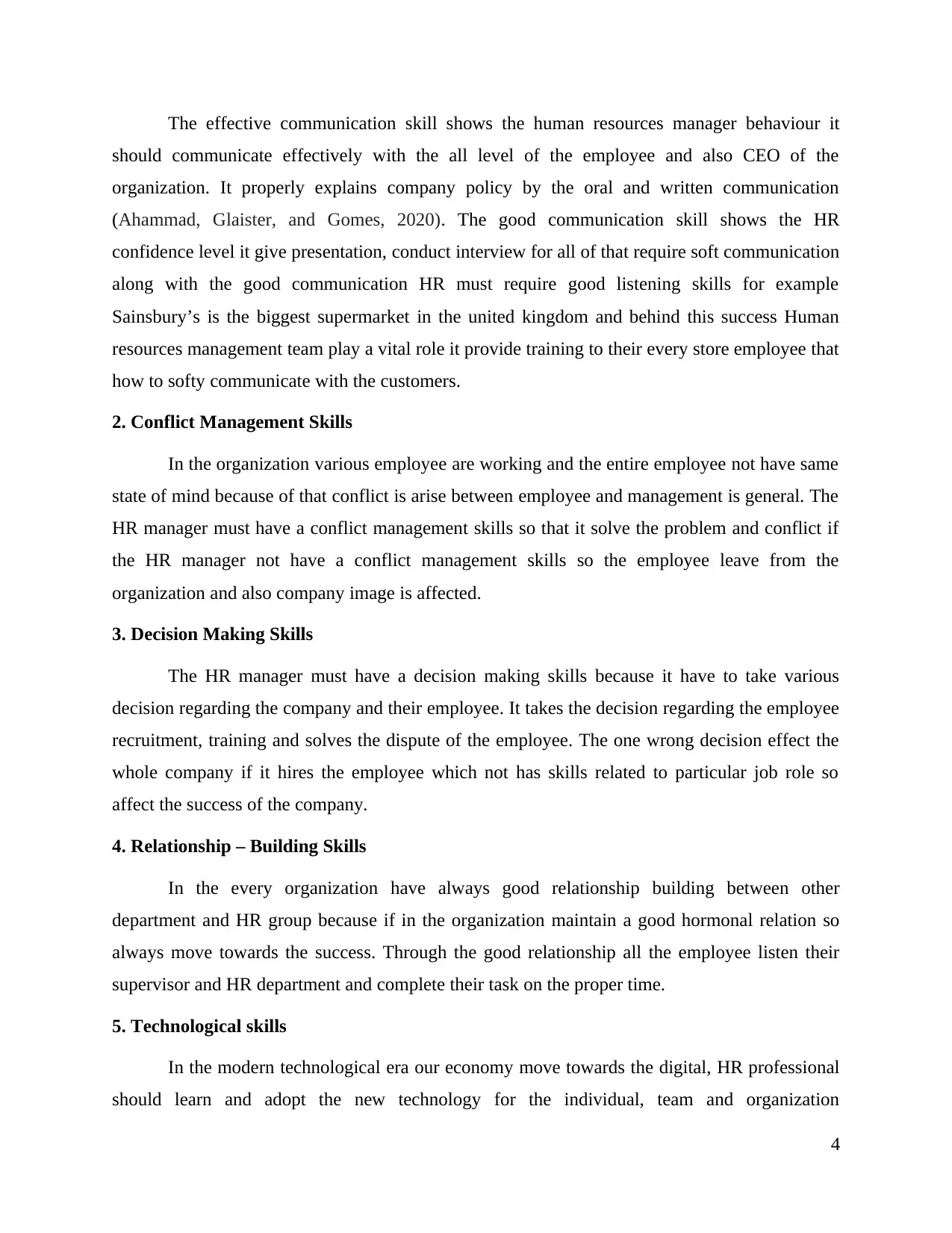
The effective communication skill shows the human resources manager behaviour it
should communicate effectively with the all level of the employee and also CEO of the
organization. It properly explains company policy by the oral and written communication
(Ahammad, Glaister, and Gomes, 2020). The good communication skill shows the HR
confidence level it give presentation, conduct interview for all of that require soft communication
along with the good communication HR must require good listening skills for example
Sainsbury’s is the biggest supermarket in the united kingdom and behind this success Human
resources management team play a vital role it provide training to their every store employee that
how to softy communicate with the customers.
2. Conflict Management Skills
In the organization various employee are working and the entire employee not have same
state of mind because of that conflict is arise between employee and management is general. The
HR manager must have a conflict management skills so that it solve the problem and conflict if
the HR manager not have a conflict management skills so the employee leave from the
organization and also company image is affected.
3. Decision Making Skills
The HR manager must have a decision making skills because it have to take various
decision regarding the company and their employee. It takes the decision regarding the employee
recruitment, training and solves the dispute of the employee. The one wrong decision effect the
whole company if it hires the employee which not has skills related to particular job role so
affect the success of the company.
4. Relationship – Building Skills
In the every organization have always good relationship building between other
department and HR group because if in the organization maintain a good hormonal relation so
always move towards the success. Through the good relationship all the employee listen their
supervisor and HR department and complete their task on the proper time.
5. Technological skills
In the modern technological era our economy move towards the digital, HR professional
should learn and adopt the new technology for the individual, team and organization
4
should communicate effectively with the all level of the employee and also CEO of the
organization. It properly explains company policy by the oral and written communication
(Ahammad, Glaister, and Gomes, 2020). The good communication skill shows the HR
confidence level it give presentation, conduct interview for all of that require soft communication
along with the good communication HR must require good listening skills for example
Sainsbury’s is the biggest supermarket in the united kingdom and behind this success Human
resources management team play a vital role it provide training to their every store employee that
how to softy communicate with the customers.
2. Conflict Management Skills
In the organization various employee are working and the entire employee not have same
state of mind because of that conflict is arise between employee and management is general. The
HR manager must have a conflict management skills so that it solve the problem and conflict if
the HR manager not have a conflict management skills so the employee leave from the
organization and also company image is affected.
3. Decision Making Skills
The HR manager must have a decision making skills because it have to take various
decision regarding the company and their employee. It takes the decision regarding the employee
recruitment, training and solves the dispute of the employee. The one wrong decision effect the
whole company if it hires the employee which not has skills related to particular job role so
affect the success of the company.
4. Relationship – Building Skills
In the every organization have always good relationship building between other
department and HR group because if in the organization maintain a good hormonal relation so
always move towards the success. Through the good relationship all the employee listen their
supervisor and HR department and complete their task on the proper time.
5. Technological skills
In the modern technological era our economy move towards the digital, HR professional
should learn and adopt the new technology for the individual, team and organization
4
Paraphrase This Document
Need a fresh take? Get an instant paraphrase of this document with our AI Paraphraser
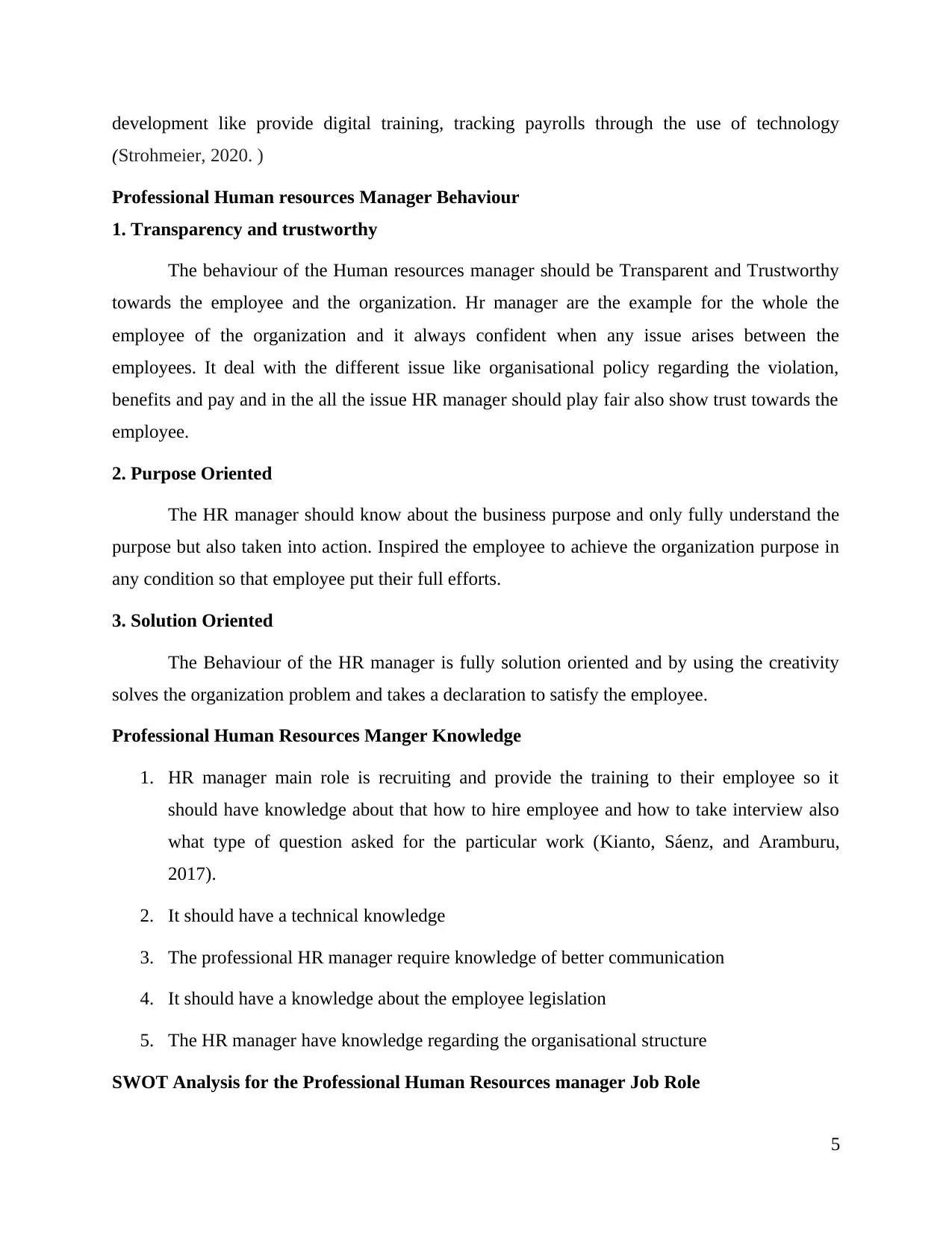
development like provide digital training, tracking payrolls through the use of technology
(Strohmeier, 2020. )
Professional Human resources Manager Behaviour
1. Transparency and trustworthy
The behaviour of the Human resources manager should be Transparent and Trustworthy
towards the employee and the organization. Hr manager are the example for the whole the
employee of the organization and it always confident when any issue arises between the
employees. It deal with the different issue like organisational policy regarding the violation,
benefits and pay and in the all the issue HR manager should play fair also show trust towards the
employee.
2. Purpose Oriented
The HR manager should know about the business purpose and only fully understand the
purpose but also taken into action. Inspired the employee to achieve the organization purpose in
any condition so that employee put their full efforts.
3. Solution Oriented
The Behaviour of the HR manager is fully solution oriented and by using the creativity
solves the organization problem and takes a declaration to satisfy the employee.
Professional Human Resources Manger Knowledge
1. HR manager main role is recruiting and provide the training to their employee so it
should have knowledge about that how to hire employee and how to take interview also
what type of question asked for the particular work (Kianto, Sáenz, and Aramburu,
2017).
2. It should have a technical knowledge
3. The professional HR manager require knowledge of better communication
4. It should have a knowledge about the employee legislation
5. The HR manager have knowledge regarding the organisational structure
SWOT Analysis for the Professional Human Resources manager Job Role
5
(Strohmeier, 2020. )
Professional Human resources Manager Behaviour
1. Transparency and trustworthy
The behaviour of the Human resources manager should be Transparent and Trustworthy
towards the employee and the organization. Hr manager are the example for the whole the
employee of the organization and it always confident when any issue arises between the
employees. It deal with the different issue like organisational policy regarding the violation,
benefits and pay and in the all the issue HR manager should play fair also show trust towards the
employee.
2. Purpose Oriented
The HR manager should know about the business purpose and only fully understand the
purpose but also taken into action. Inspired the employee to achieve the organization purpose in
any condition so that employee put their full efforts.
3. Solution Oriented
The Behaviour of the HR manager is fully solution oriented and by using the creativity
solves the organization problem and takes a declaration to satisfy the employee.
Professional Human Resources Manger Knowledge
1. HR manager main role is recruiting and provide the training to their employee so it
should have knowledge about that how to hire employee and how to take interview also
what type of question asked for the particular work (Kianto, Sáenz, and Aramburu,
2017).
2. It should have a technical knowledge
3. The professional HR manager require knowledge of better communication
4. It should have a knowledge about the employee legislation
5. The HR manager have knowledge regarding the organisational structure
SWOT Analysis for the Professional Human Resources manager Job Role
5
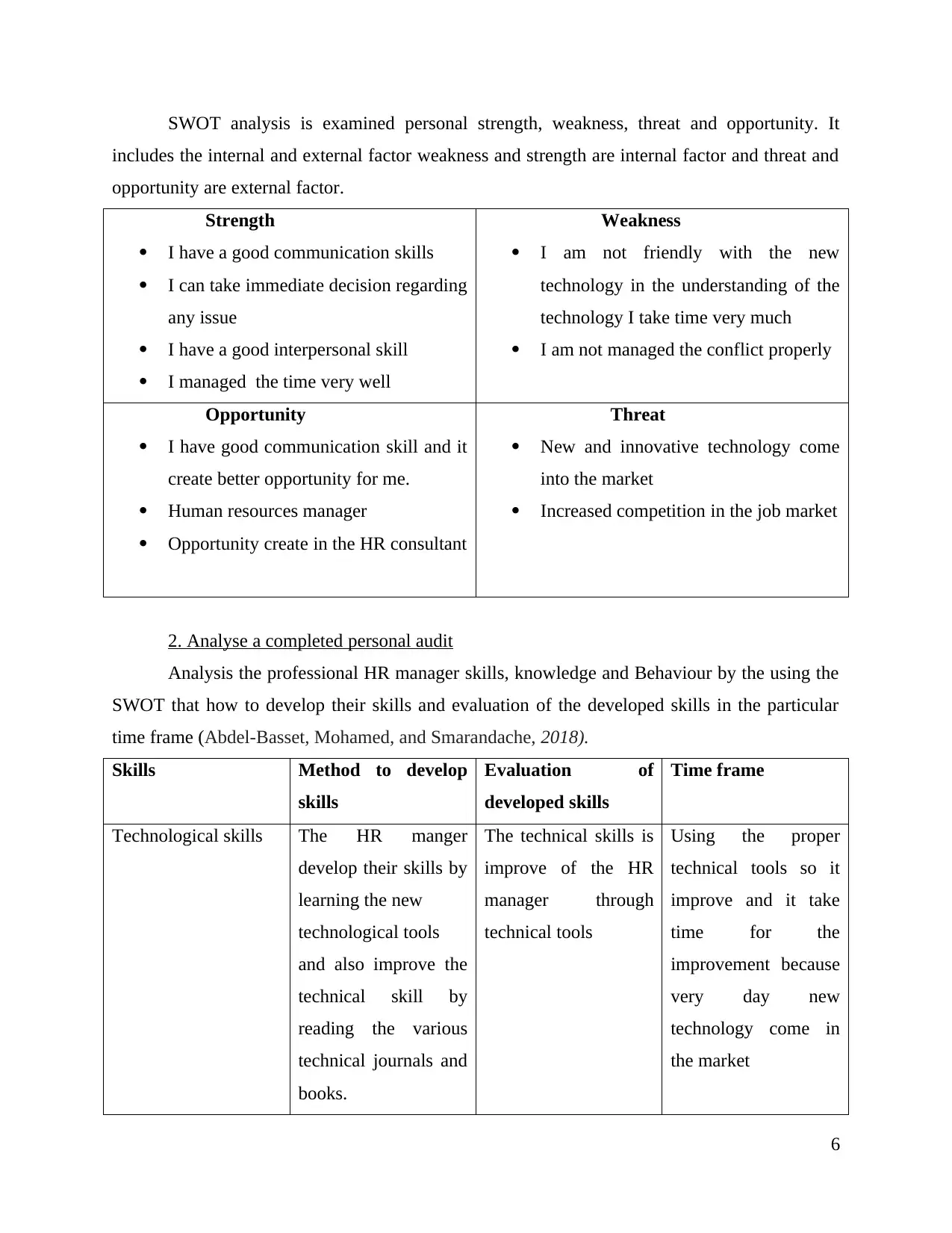
SWOT analysis is examined personal strength, weakness, threat and opportunity. It
includes the internal and external factor weakness and strength are internal factor and threat and
opportunity are external factor.
Strength
I have a good communication skills
I can take immediate decision regarding
any issue
I have a good interpersonal skill
I managed the time very well
Weakness
I am not friendly with the new
technology in the understanding of the
technology I take time very much
I am not managed the conflict properly
Opportunity
I have good communication skill and it
create better opportunity for me.
Human resources manager
Opportunity create in the HR consultant
Threat
New and innovative technology come
into the market
Increased competition in the job market
2. Analyse a completed personal audit
Analysis the professional HR manager skills, knowledge and Behaviour by the using the
SWOT that how to develop their skills and evaluation of the developed skills in the particular
time frame (Abdel-Basset, Mohamed, and Smarandache, 2018).
Skills Method to develop
skills
Evaluation of
developed skills
Time frame
Technological skills The HR manger
develop their skills by
learning the new
technological tools
and also improve the
technical skill by
reading the various
technical journals and
books.
The technical skills is
improve of the HR
manager through
technical tools
Using the proper
technical tools so it
improve and it take
time for the
improvement because
very day new
technology come in
the market
6
includes the internal and external factor weakness and strength are internal factor and threat and
opportunity are external factor.
Strength
I have a good communication skills
I can take immediate decision regarding
any issue
I have a good interpersonal skill
I managed the time very well
Weakness
I am not friendly with the new
technology in the understanding of the
technology I take time very much
I am not managed the conflict properly
Opportunity
I have good communication skill and it
create better opportunity for me.
Human resources manager
Opportunity create in the HR consultant
Threat
New and innovative technology come
into the market
Increased competition in the job market
2. Analyse a completed personal audit
Analysis the professional HR manager skills, knowledge and Behaviour by the using the
SWOT that how to develop their skills and evaluation of the developed skills in the particular
time frame (Abdel-Basset, Mohamed, and Smarandache, 2018).
Skills Method to develop
skills
Evaluation of
developed skills
Time frame
Technological skills The HR manger
develop their skills by
learning the new
technological tools
and also improve the
technical skill by
reading the various
technical journals and
books.
The technical skills is
improve of the HR
manager through
technical tools
Using the proper
technical tools so it
improve and it take
time for the
improvement because
very day new
technology come in
the market
6
⊘ This is a preview!⊘
Do you want full access?
Subscribe today to unlock all pages.

Trusted by 1+ million students worldwide
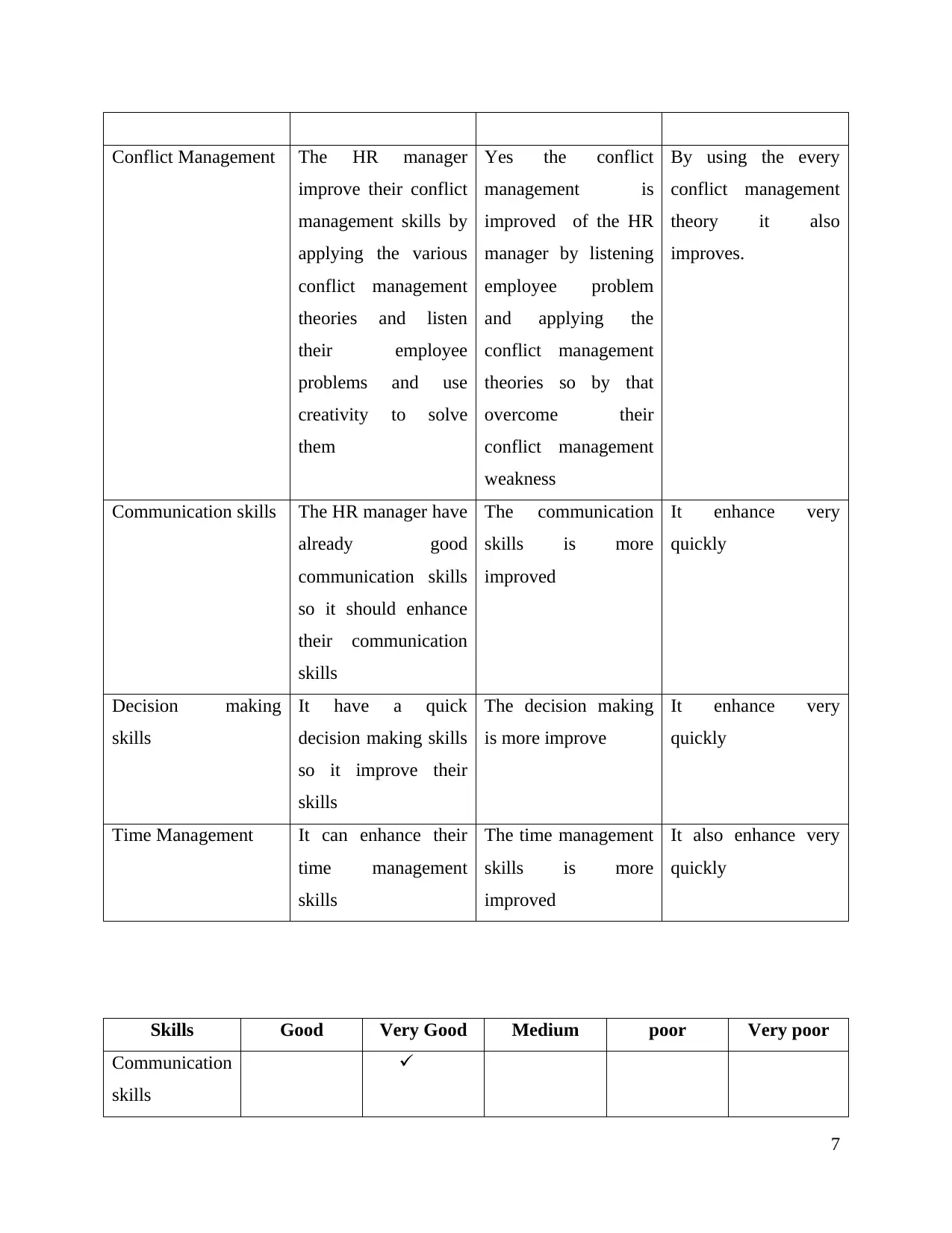
Conflict Management The HR manager
improve their conflict
management skills by
applying the various
conflict management
theories and listen
their employee
problems and use
creativity to solve
them
Yes the conflict
management is
improved of the HR
manager by listening
employee problem
and applying the
conflict management
theories so by that
overcome their
conflict management
weakness
By using the every
conflict management
theory it also
improves.
Communication skills The HR manager have
already good
communication skills
so it should enhance
their communication
skills
The communication
skills is more
improved
It enhance very
quickly
Decision making
skills
It have a quick
decision making skills
so it improve their
skills
The decision making
is more improve
It enhance very
quickly
Time Management It can enhance their
time management
skills
The time management
skills is more
improved
It also enhance very
quickly
Skills Good Very Good Medium poor Very poor
Communication
skills
7
improve their conflict
management skills by
applying the various
conflict management
theories and listen
their employee
problems and use
creativity to solve
them
Yes the conflict
management is
improved of the HR
manager by listening
employee problem
and applying the
conflict management
theories so by that
overcome their
conflict management
weakness
By using the every
conflict management
theory it also
improves.
Communication skills The HR manager have
already good
communication skills
so it should enhance
their communication
skills
The communication
skills is more
improved
It enhance very
quickly
Decision making
skills
It have a quick
decision making skills
so it improve their
skills
The decision making
is more improve
It enhance very
quickly
Time Management It can enhance their
time management
skills
The time management
skills is more
improved
It also enhance very
quickly
Skills Good Very Good Medium poor Very poor
Communication
skills
7
Paraphrase This Document
Need a fresh take? Get an instant paraphrase of this document with our AI Paraphraser
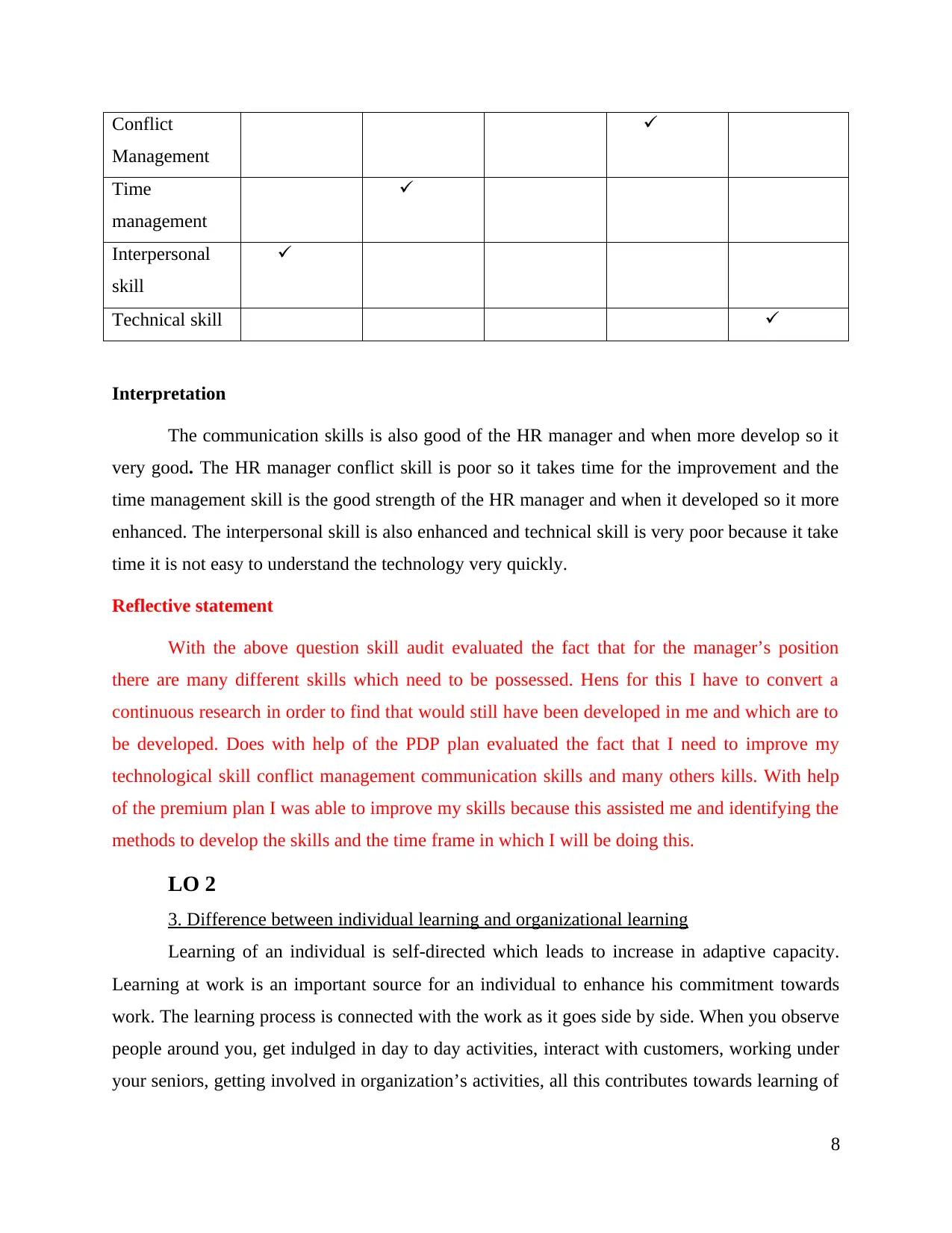
Conflict
Management
Time
management
Interpersonal
skill
Technical skill
Interpretation
The communication skills is also good of the HR manager and when more develop so it
very good. The HR manager conflict skill is poor so it takes time for the improvement and the
time management skill is the good strength of the HR manager and when it developed so it more
enhanced. The interpersonal skill is also enhanced and technical skill is very poor because it take
time it is not easy to understand the technology very quickly.
Reflective statement
With the above question skill audit evaluated the fact that for the manager’s position
there are many different skills which need to be possessed. Hens for this I have to convert a
continuous research in order to find that would still have been developed in me and which are to
be developed. Does with help of the PDP plan evaluated the fact that I need to improve my
technological skill conflict management communication skills and many others kills. With help
of the premium plan I was able to improve my skills because this assisted me and identifying the
methods to develop the skills and the time frame in which I will be doing this.
LO 2
3. Difference between individual learning and organizational learning
Learning of an individual is self-directed which leads to increase in adaptive capacity.
Learning at work is an important source for an individual to enhance his commitment towards
work. The learning process is connected with the work as it goes side by side. When you observe
people around you, get indulged in day to day activities, interact with customers, working under
your seniors, getting involved in organization’s activities, all this contributes towards learning of
8
Management
Time
management
Interpersonal
skill
Technical skill
Interpretation
The communication skills is also good of the HR manager and when more develop so it
very good. The HR manager conflict skill is poor so it takes time for the improvement and the
time management skill is the good strength of the HR manager and when it developed so it more
enhanced. The interpersonal skill is also enhanced and technical skill is very poor because it take
time it is not easy to understand the technology very quickly.
Reflective statement
With the above question skill audit evaluated the fact that for the manager’s position
there are many different skills which need to be possessed. Hens for this I have to convert a
continuous research in order to find that would still have been developed in me and which are to
be developed. Does with help of the PDP plan evaluated the fact that I need to improve my
technological skill conflict management communication skills and many others kills. With help
of the premium plan I was able to improve my skills because this assisted me and identifying the
methods to develop the skills and the time frame in which I will be doing this.
LO 2
3. Difference between individual learning and organizational learning
Learning of an individual is self-directed which leads to increase in adaptive capacity.
Learning at work is an important source for an individual to enhance his commitment towards
work. The learning process is connected with the work as it goes side by side. When you observe
people around you, get indulged in day to day activities, interact with customers, working under
your seniors, getting involved in organization’s activities, all this contributes towards learning of
8
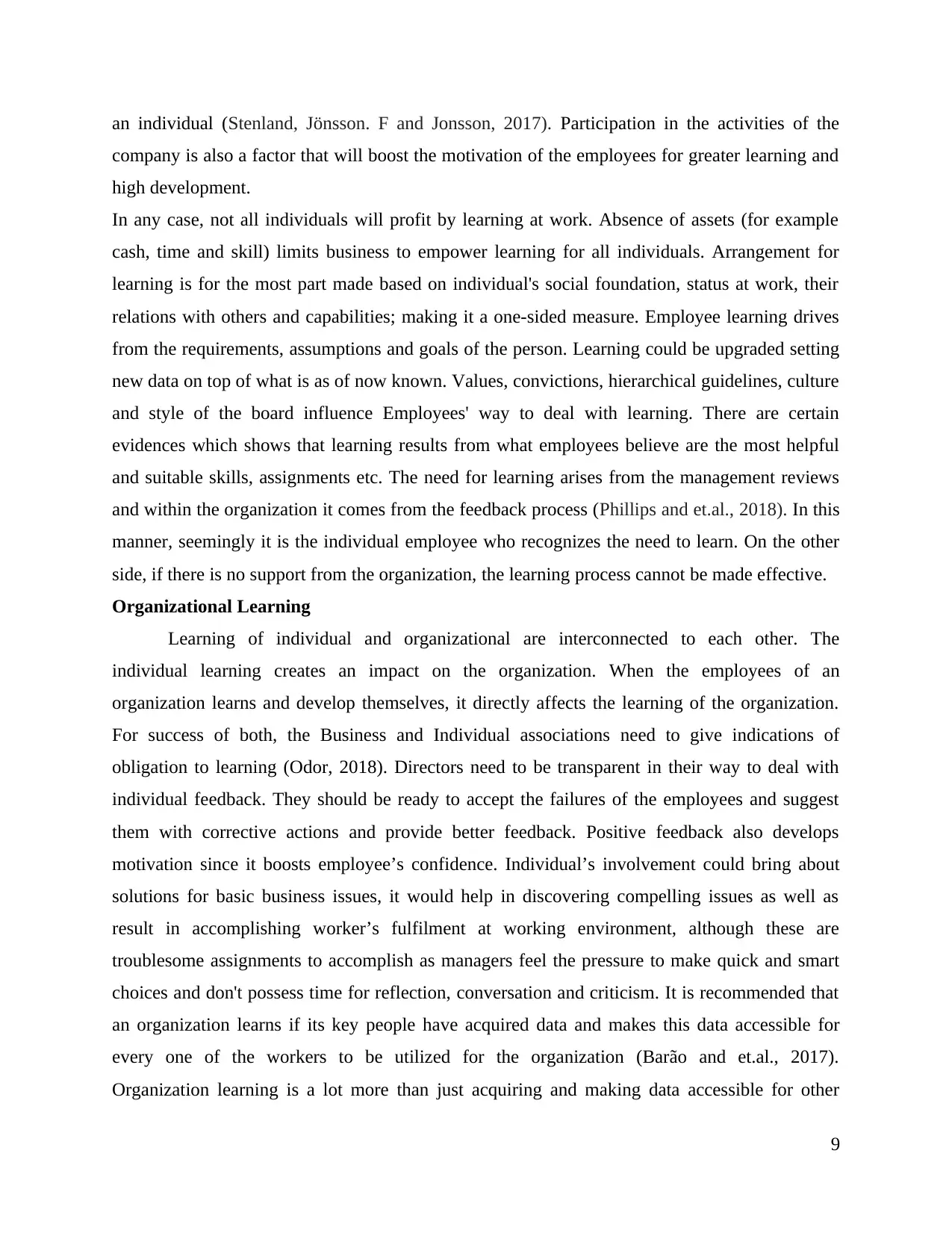
an individual (Stenland, Jönsson. F and Jonsson, 2017). Participation in the activities of the
company is also a factor that will boost the motivation of the employees for greater learning and
high development.
In any case, not all individuals will profit by learning at work. Absence of assets (for example
cash, time and skill) limits business to empower learning for all individuals. Arrangement for
learning is for the most part made based on individual's social foundation, status at work, their
relations with others and capabilities; making it a one-sided measure. Employee learning drives
from the requirements, assumptions and goals of the person. Learning could be upgraded setting
new data on top of what is as of now known. Values, convictions, hierarchical guidelines, culture
and style of the board influence Employees' way to deal with learning. There are certain
evidences which shows that learning results from what employees believe are the most helpful
and suitable skills, assignments etc. The need for learning arises from the management reviews
and within the organization it comes from the feedback process (Phillips and et.al., 2018). In this
manner, seemingly it is the individual employee who recognizes the need to learn. On the other
side, if there is no support from the organization, the learning process cannot be made effective.
Organizational Learning
Learning of individual and organizational are interconnected to each other. The
individual learning creates an impact on the organization. When the employees of an
organization learns and develop themselves, it directly affects the learning of the organization.
For success of both, the Business and Individual associations need to give indications of
obligation to learning (Odor, 2018). Directors need to be transparent in their way to deal with
individual feedback. They should be ready to accept the failures of the employees and suggest
them with corrective actions and provide better feedback. Positive feedback also develops
motivation since it boosts employee’s confidence. Individual’s involvement could bring about
solutions for basic business issues, it would help in discovering compelling issues as well as
result in accomplishing worker’s fulfilment at working environment, although these are
troublesome assignments to accomplish as managers feel the pressure to make quick and smart
choices and don't possess time for reflection, conversation and criticism. It is recommended that
an organization learns if its key people have acquired data and makes this data accessible for
every one of the workers to be utilized for the organization (Barão and et.al., 2017).
Organization learning is a lot more than just acquiring and making data accessible for other
9
company is also a factor that will boost the motivation of the employees for greater learning and
high development.
In any case, not all individuals will profit by learning at work. Absence of assets (for example
cash, time and skill) limits business to empower learning for all individuals. Arrangement for
learning is for the most part made based on individual's social foundation, status at work, their
relations with others and capabilities; making it a one-sided measure. Employee learning drives
from the requirements, assumptions and goals of the person. Learning could be upgraded setting
new data on top of what is as of now known. Values, convictions, hierarchical guidelines, culture
and style of the board influence Employees' way to deal with learning. There are certain
evidences which shows that learning results from what employees believe are the most helpful
and suitable skills, assignments etc. The need for learning arises from the management reviews
and within the organization it comes from the feedback process (Phillips and et.al., 2018). In this
manner, seemingly it is the individual employee who recognizes the need to learn. On the other
side, if there is no support from the organization, the learning process cannot be made effective.
Organizational Learning
Learning of individual and organizational are interconnected to each other. The
individual learning creates an impact on the organization. When the employees of an
organization learns and develop themselves, it directly affects the learning of the organization.
For success of both, the Business and Individual associations need to give indications of
obligation to learning (Odor, 2018). Directors need to be transparent in their way to deal with
individual feedback. They should be ready to accept the failures of the employees and suggest
them with corrective actions and provide better feedback. Positive feedback also develops
motivation since it boosts employee’s confidence. Individual’s involvement could bring about
solutions for basic business issues, it would help in discovering compelling issues as well as
result in accomplishing worker’s fulfilment at working environment, although these are
troublesome assignments to accomplish as managers feel the pressure to make quick and smart
choices and don't possess time for reflection, conversation and criticism. It is recommended that
an organization learns if its key people have acquired data and makes this data accessible for
every one of the workers to be utilized for the organization (Barão and et.al., 2017).
Organization learning is a lot more than just acquiring and making data accessible for other
9
⊘ This is a preview!⊘
Do you want full access?
Subscribe today to unlock all pages.

Trusted by 1+ million students worldwide
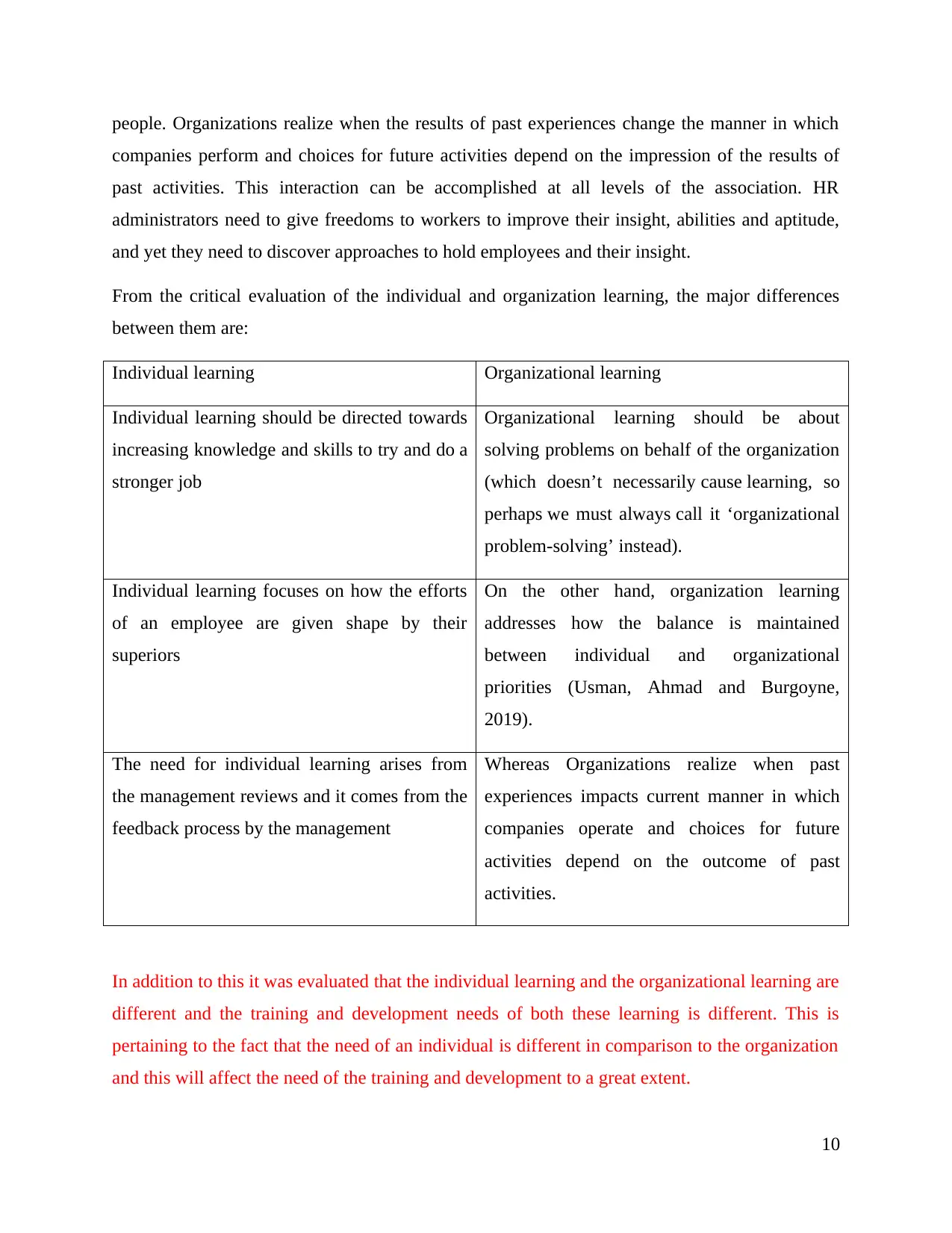
people. Organizations realize when the results of past experiences change the manner in which
companies perform and choices for future activities depend on the impression of the results of
past activities. This interaction can be accomplished at all levels of the association. HR
administrators need to give freedoms to workers to improve their insight, abilities and aptitude,
and yet they need to discover approaches to hold employees and their insight.
From the critical evaluation of the individual and organization learning, the major differences
between them are:
Individual learning Organizational learning
Individual learning should be directed towards
increasing knowledge and skills to try and do a
stronger job
Organizational learning should be about
solving problems on behalf of the organization
(which doesn’t necessarily cause learning, so
perhaps we must always call it ‘organizational
problem-solving’ instead).
Individual learning focuses on how the efforts
of an employee are given shape by their
superiors
On the other hand, organization learning
addresses how the balance is maintained
between individual and organizational
priorities (Usman, Ahmad and Burgoyne,
2019).
The need for individual learning arises from
the management reviews and it comes from the
feedback process by the management
Whereas Organizations realize when past
experiences impacts current manner in which
companies operate and choices for future
activities depend on the outcome of past
activities.
In addition to this it was evaluated that the individual learning and the organizational learning are
different and the training and development needs of both these learning is different. This is
pertaining to the fact that the need of an individual is different in comparison to the organization
and this will affect the need of the training and development to a great extent.
10
companies perform and choices for future activities depend on the impression of the results of
past activities. This interaction can be accomplished at all levels of the association. HR
administrators need to give freedoms to workers to improve their insight, abilities and aptitude,
and yet they need to discover approaches to hold employees and their insight.
From the critical evaluation of the individual and organization learning, the major differences
between them are:
Individual learning Organizational learning
Individual learning should be directed towards
increasing knowledge and skills to try and do a
stronger job
Organizational learning should be about
solving problems on behalf of the organization
(which doesn’t necessarily cause learning, so
perhaps we must always call it ‘organizational
problem-solving’ instead).
Individual learning focuses on how the efforts
of an employee are given shape by their
superiors
On the other hand, organization learning
addresses how the balance is maintained
between individual and organizational
priorities (Usman, Ahmad and Burgoyne,
2019).
The need for individual learning arises from
the management reviews and it comes from the
feedback process by the management
Whereas Organizations realize when past
experiences impacts current manner in which
companies operate and choices for future
activities depend on the outcome of past
activities.
In addition to this it was evaluated that the individual learning and the organizational learning are
different and the training and development needs of both these learning is different. This is
pertaining to the fact that the need of an individual is different in comparison to the organization
and this will affect the need of the training and development to a great extent.
10
Paraphrase This Document
Need a fresh take? Get an instant paraphrase of this document with our AI Paraphraser
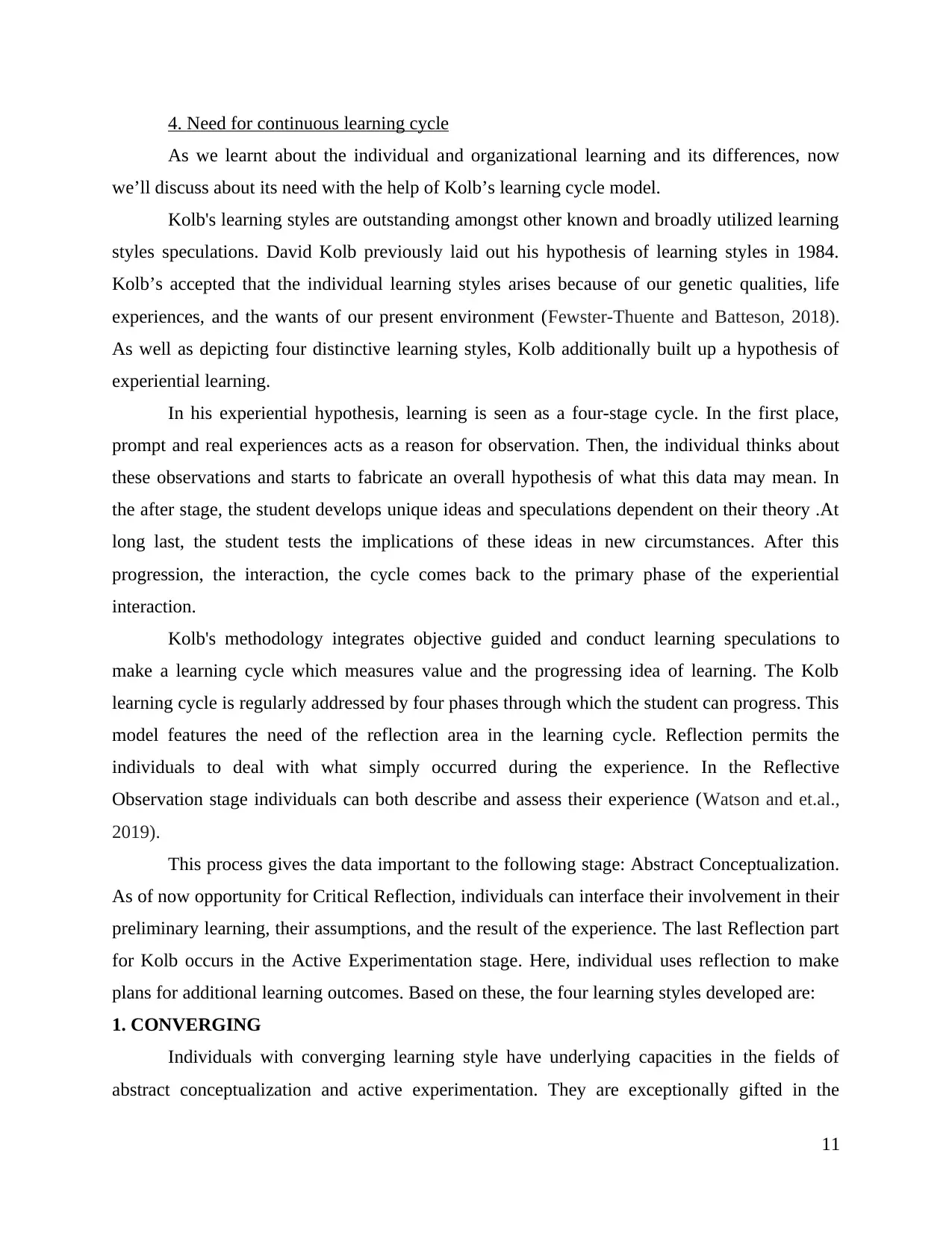
4. Need for continuous learning cycle
As we learnt about the individual and organizational learning and its differences, now
we’ll discuss about its need with the help of Kolb’s learning cycle model.
Kolb's learning styles are outstanding amongst other known and broadly utilized learning
styles speculations. David Kolb previously laid out his hypothesis of learning styles in 1984.
Kolb’s accepted that the individual learning styles arises because of our genetic qualities, life
experiences, and the wants of our present environment (Fewster-Thuente and Batteson, 2018).
As well as depicting four distinctive learning styles, Kolb additionally built up a hypothesis of
experiential learning.
In his experiential hypothesis, learning is seen as a four-stage cycle. In the first place,
prompt and real experiences acts as a reason for observation. Then, the individual thinks about
these observations and starts to fabricate an overall hypothesis of what this data may mean. In
the after stage, the student develops unique ideas and speculations dependent on their theory .At
long last, the student tests the implications of these ideas in new circumstances. After this
progression, the interaction, the cycle comes back to the primary phase of the experiential
interaction.
Kolb's methodology integrates objective guided and conduct learning speculations to
make a learning cycle which measures value and the progressing idea of learning. The Kolb
learning cycle is regularly addressed by four phases through which the student can progress. This
model features the need of the reflection area in the learning cycle. Reflection permits the
individuals to deal with what simply occurred during the experience. In the Reflective
Observation stage individuals can both describe and assess their experience (Watson and et.al.,
2019).
This process gives the data important to the following stage: Abstract Conceptualization.
As of now opportunity for Critical Reflection, individuals can interface their involvement in their
preliminary learning, their assumptions, and the result of the experience. The last Reflection part
for Kolb occurs in the Active Experimentation stage. Here, individual uses reflection to make
plans for additional learning outcomes. Based on these, the four learning styles developed are:
1. CONVERGING
Individuals with converging learning style have underlying capacities in the fields of
abstract conceptualization and active experimentation. They are exceptionally gifted in the
11
As we learnt about the individual and organizational learning and its differences, now
we’ll discuss about its need with the help of Kolb’s learning cycle model.
Kolb's learning styles are outstanding amongst other known and broadly utilized learning
styles speculations. David Kolb previously laid out his hypothesis of learning styles in 1984.
Kolb’s accepted that the individual learning styles arises because of our genetic qualities, life
experiences, and the wants of our present environment (Fewster-Thuente and Batteson, 2018).
As well as depicting four distinctive learning styles, Kolb additionally built up a hypothesis of
experiential learning.
In his experiential hypothesis, learning is seen as a four-stage cycle. In the first place,
prompt and real experiences acts as a reason for observation. Then, the individual thinks about
these observations and starts to fabricate an overall hypothesis of what this data may mean. In
the after stage, the student develops unique ideas and speculations dependent on their theory .At
long last, the student tests the implications of these ideas in new circumstances. After this
progression, the interaction, the cycle comes back to the primary phase of the experiential
interaction.
Kolb's methodology integrates objective guided and conduct learning speculations to
make a learning cycle which measures value and the progressing idea of learning. The Kolb
learning cycle is regularly addressed by four phases through which the student can progress. This
model features the need of the reflection area in the learning cycle. Reflection permits the
individuals to deal with what simply occurred during the experience. In the Reflective
Observation stage individuals can both describe and assess their experience (Watson and et.al.,
2019).
This process gives the data important to the following stage: Abstract Conceptualization.
As of now opportunity for Critical Reflection, individuals can interface their involvement in their
preliminary learning, their assumptions, and the result of the experience. The last Reflection part
for Kolb occurs in the Active Experimentation stage. Here, individual uses reflection to make
plans for additional learning outcomes. Based on these, the four learning styles developed are:
1. CONVERGING
Individuals with converging learning style have underlying capacities in the fields of
abstract conceptualization and active experimentation. They are exceptionally gifted in the
11
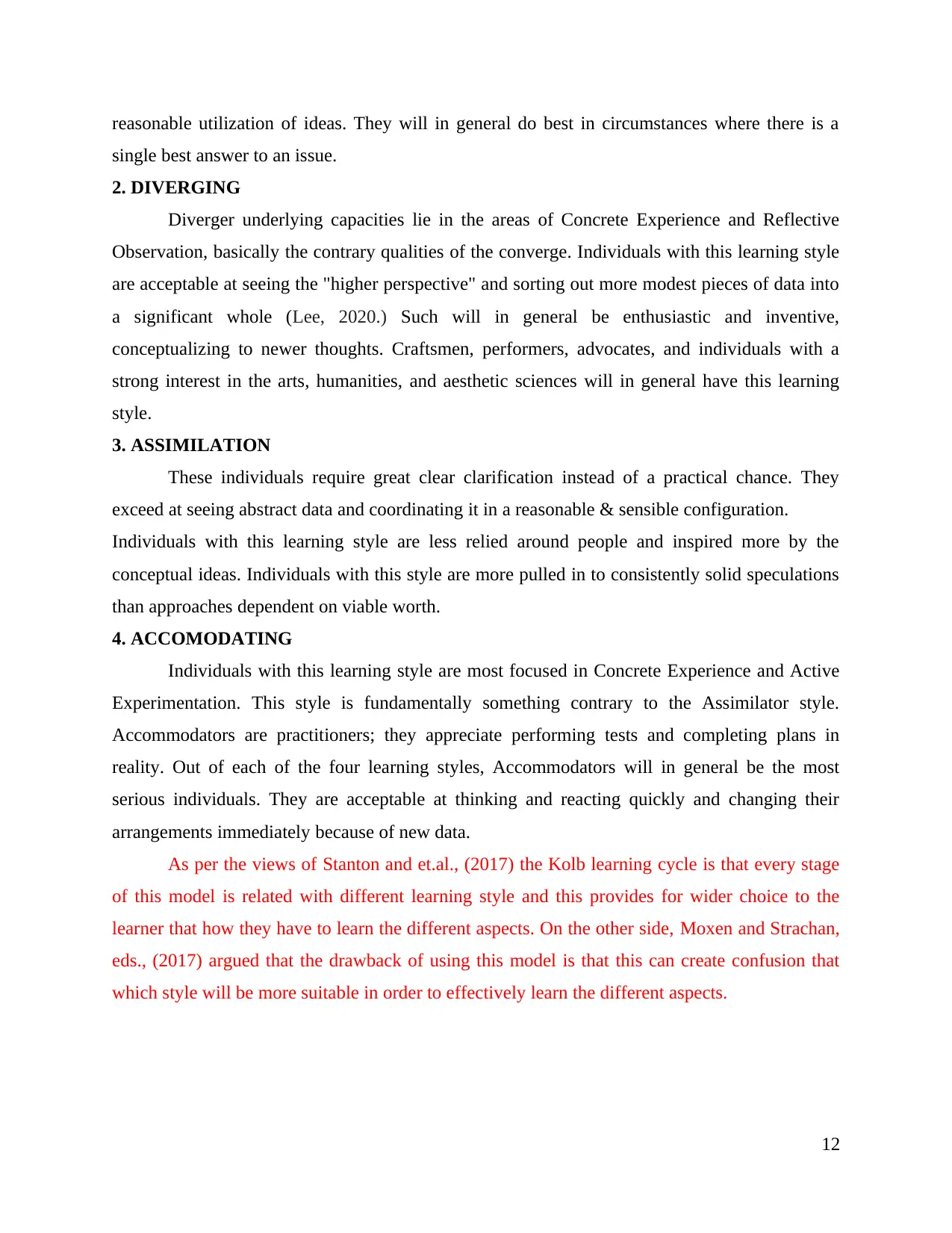
reasonable utilization of ideas. They will in general do best in circumstances where there is a
single best answer to an issue.
2. DIVERGING
Diverger underlying capacities lie in the areas of Concrete Experience and Reflective
Observation, basically the contrary qualities of the converge. Individuals with this learning style
are acceptable at seeing the "higher perspective" and sorting out more modest pieces of data into
a significant whole (Lee, 2020.) Such will in general be enthusiastic and inventive,
conceptualizing to newer thoughts. Craftsmen, performers, advocates, and individuals with a
strong interest in the arts, humanities, and aesthetic sciences will in general have this learning
style.
3. ASSIMILATION
These individuals require great clear clarification instead of a practical chance. They
exceed at seeing abstract data and coordinating it in a reasonable & sensible configuration.
Individuals with this learning style are less relied around people and inspired more by the
conceptual ideas. Individuals with this style are more pulled in to consistently solid speculations
than approaches dependent on viable worth.
4. ACCOMODATING
Individuals with this learning style are most focused in Concrete Experience and Active
Experimentation. This style is fundamentally something contrary to the Assimilator style.
Accommodators are practitioners; they appreciate performing tests and completing plans in
reality. Out of each of the four learning styles, Accommodators will in general be the most
serious individuals. They are acceptable at thinking and reacting quickly and changing their
arrangements immediately because of new data.
As per the views of Stanton and et.al., (2017) the Kolb learning cycle is that every stage
of this model is related with different learning style and this provides for wider choice to the
learner that how they have to learn the different aspects. On the other side, Moxen and Strachan,
eds., (2017) argued that the drawback of using this model is that this can create confusion that
which style will be more suitable in order to effectively learn the different aspects.
12
single best answer to an issue.
2. DIVERGING
Diverger underlying capacities lie in the areas of Concrete Experience and Reflective
Observation, basically the contrary qualities of the converge. Individuals with this learning style
are acceptable at seeing the "higher perspective" and sorting out more modest pieces of data into
a significant whole (Lee, 2020.) Such will in general be enthusiastic and inventive,
conceptualizing to newer thoughts. Craftsmen, performers, advocates, and individuals with a
strong interest in the arts, humanities, and aesthetic sciences will in general have this learning
style.
3. ASSIMILATION
These individuals require great clear clarification instead of a practical chance. They
exceed at seeing abstract data and coordinating it in a reasonable & sensible configuration.
Individuals with this learning style are less relied around people and inspired more by the
conceptual ideas. Individuals with this style are more pulled in to consistently solid speculations
than approaches dependent on viable worth.
4. ACCOMODATING
Individuals with this learning style are most focused in Concrete Experience and Active
Experimentation. This style is fundamentally something contrary to the Assimilator style.
Accommodators are practitioners; they appreciate performing tests and completing plans in
reality. Out of each of the four learning styles, Accommodators will in general be the most
serious individuals. They are acceptable at thinking and reacting quickly and changing their
arrangements immediately because of new data.
As per the views of Stanton and et.al., (2017) the Kolb learning cycle is that every stage
of this model is related with different learning style and this provides for wider choice to the
learner that how they have to learn the different aspects. On the other side, Moxen and Strachan,
eds., (2017) argued that the drawback of using this model is that this can create confusion that
which style will be more suitable in order to effectively learn the different aspects.
12
⊘ This is a preview!⊘
Do you want full access?
Subscribe today to unlock all pages.

Trusted by 1+ million students worldwide
1 out of 19
Related Documents
Your All-in-One AI-Powered Toolkit for Academic Success.
+13062052269
info@desklib.com
Available 24*7 on WhatsApp / Email
![[object Object]](/_next/static/media/star-bottom.7253800d.svg)
Unlock your academic potential
Copyright © 2020–2026 A2Z Services. All Rights Reserved. Developed and managed by ZUCOL.





